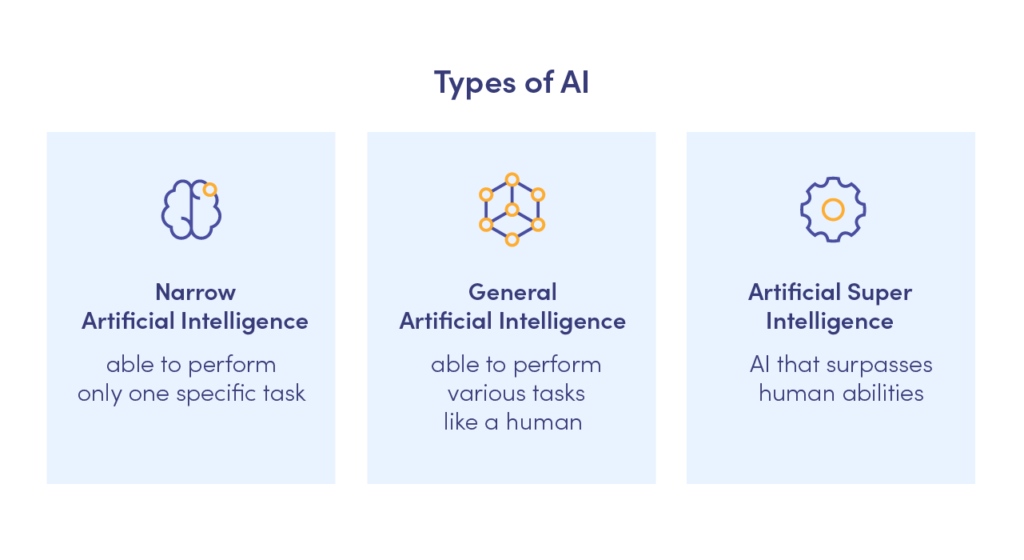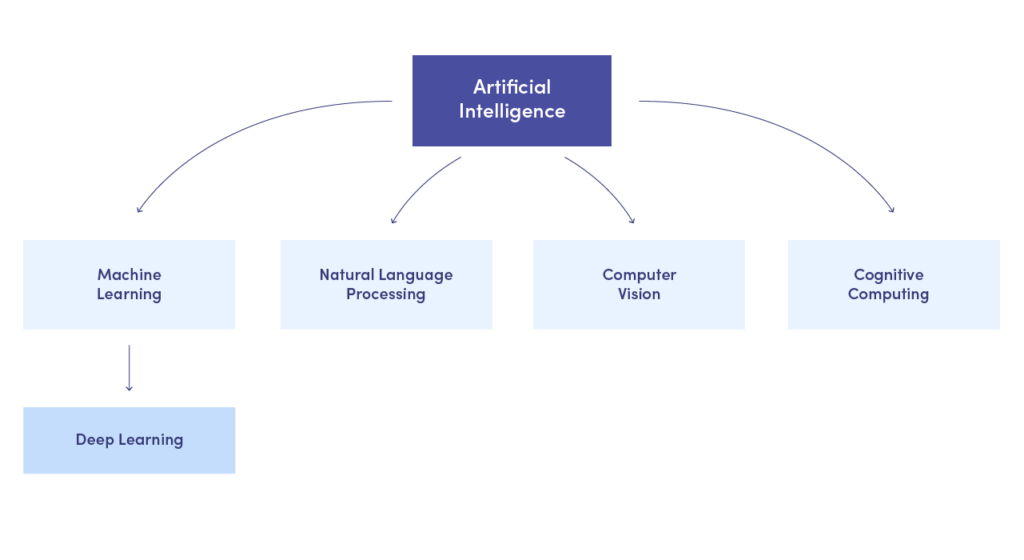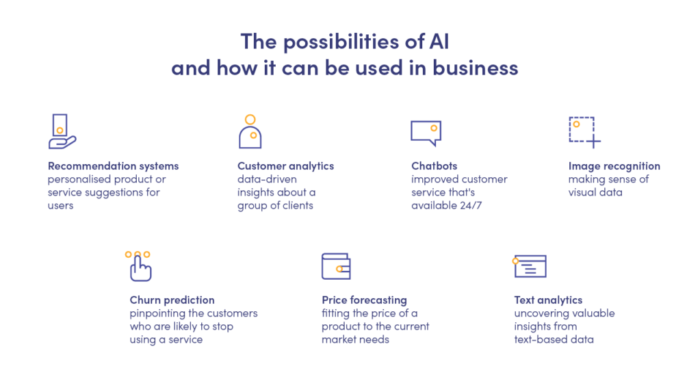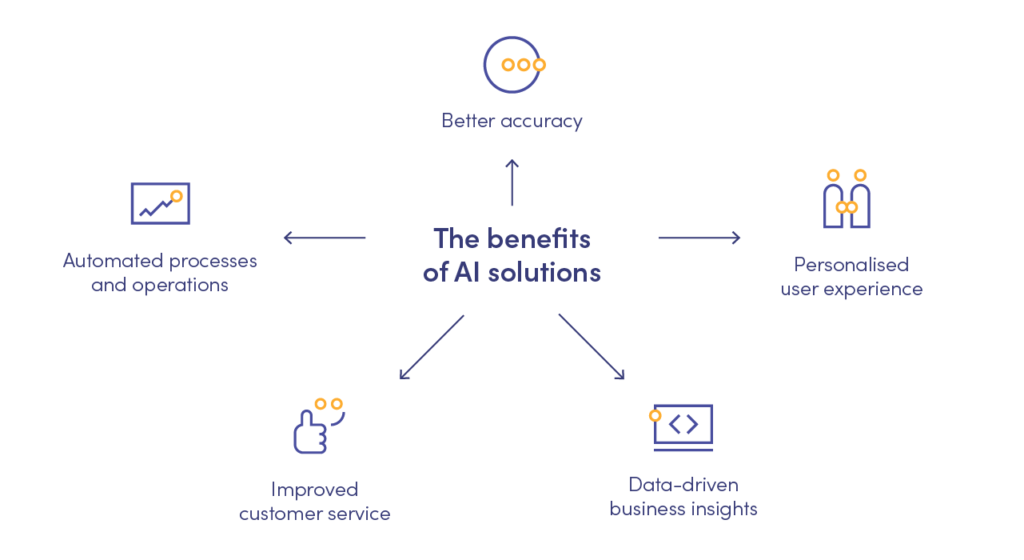Artificial Intelligence has been the term on everyone’s lips in the world of tech. Over the years, we’ve watched it turn from a science fiction concept to an available solution to many of our real-life problems. From voice assistants, through social media algorithms, all the way to Netflix’s recommendation engine – AI is present in our everyday lives, and virtually everyone has heard about it in one way or another.
One of the hottest topics of recent years, however, is (very unsurprisingly) the use of artificial intelligence in business. With 83% of executives having AI as their strategic priority, the expectations for the technology grow every year.
But what lies beneath the buzzword, how is it exactly being used, and – most importantly – how can it benefit businesses in a meaningful way?
This article will answer all those questions and more, and hopefully help you choose the AI solution that suits your company best.
First off, let’s start with the basics.
What is AI?
There have been a few different definitions over the decades, but to keep it short and simple:
Artificial Intelligence is a cross-disciplinary field of science that aims to teach machines to mimic human intelligence and perform tasks that are normally done by humans.
By using Artificial Intelligence, we can automate the tasks that we’d previously need to perform manually, all while making the processes more efficient and optimised.
The term “Artificial Intelligence” covers many topics, but this quick explanation serves as a broad basis for all which will be covered in this article: the subsets, types and different uses of AI, and its applications in business.
But before we get to that, there is one pressing question we’ll need to answer first: How exactly does it all work?
How does AI work?
You already know that the main goal of AI is to make machines act similar to us good ol’ humans. Now, let’s dig a little deeper.
If you’re a bit more familiar with the topic of Artificial Intelligence, you might have stumbled upon the occasional debate about whether so-called “true AI”, one that would perfectly fit the definition, actually exists.
That’s right – the question “is AI even a thing?” is still part of the discussion.
AI currently works with the use of an extensive amount of information and data the machine can learn from and act accordingly. Thanks to advanced mathematical algorithms and calculations, AI is able to process data in a similar manner to a human brain. This means it can not only analyse, but also learn from patterns, make decisions and solve complex problems.
AI can not only analyse, but also learn from patterns, make decisions, and solve complex problems.
To help you better understand the concept, let’s look at how AI is currently used in finance. By using data about previous outcomes, AI is able to perform risk assessments and detect unusual, potentially suspicious transactions.
To put it simply, AI needs some kind of input in order to work. This is why some still get annoyed with the term “Artificial Intelligence”: a machine that would be able to think, act and perform exactly as a human would do doesn’t actually exist (yet).
In order to fully understand what we do actually have now, and what still may lay ahead of Artificial Intelligence, we have to take a closer look at what this science field is all about.
Types of AI
There are many different ways in which Artificial Intelligence can be categorised, but we’re going to focus on the three most important types of AI:
- Narrow Artificial Intelligence – Which is dedicated to performing only one task and operates under certain limitations. It’s the AI we’re accustomed to, and the one we’re most likely to find in our everyday lives, such as virtual assistants or chatbots, for example.
- General Artificial Intelligence – Also known as strong Artificial Intelligence, this is a much more complex form of AI, where a machine is able to perform on par with human intelligence, i.e to think and solve problems on its own. As of now, strong AI has not yet been developed, though scientists are actively trying to make it possible.
- Artificial Super Intelligence – Where machines gain consciousness on their own, surpass human abilities, and science fiction plots become reality. Needless to say, Artificial Super Intelligence is not currently possible, even if sensationalist headlines may claim otherwise.

As you can see, there are still many possibilities that lay ahead of AI, some of which may never be achieved. The Artificial Intelligence available to us now is still very impressive, but the aspirations for the field aim much higher than that.
We’ll talk more about the exciting future of AI later in this article, but for now, let’s move on to what the present has to offer.
Subsets of AI
Artificial Intelligence is a very broad term. The field itself comes under many different names, some of which you might be more familiar with than others. The subsets are all part of Artificial Intelligence, but focus on solving specific problems, and are much narrower concepts than AI itself.

Let’s go through the main subsets of AI, one by one:
- Machine Learning – As the name suggests, Machine Learning is about teaching a machine to learn through experience and the use of data. Plainly speaking, ML is about recognising patterns in the data, thanks to which the machine is able to produce a relevant output.
- Deep Learning – This is a part of ML where the machine is able to learn thanks to specific, complex models – deep artificial neural networks. Thanks to deep learning, the machine can filter data through many hidden layers, a process that resembles the way humans think with utmost accuracy. Check our article if you’d like to learn more about the difference between Machine Learning and Deep Learning.
- Natural Language Processing (NLP) – Covers everything related to human language: contextual reading, writing, speaking, interpreting etc. It deals with automatic manipulation and understanding of a text in either written or spoken form. Natural language processing is used, for example, for the purpose of sentiment analysis.
- Computer Vision – Focused on finding patterns and extracting information from visuals, and obtaining actionable insights based on image or video analysis. You’re probably familiar with one of the most popular applications of computer vision development solutions – face recognition.
- Cognitive Computing – This subset focuses on mimicking the thought process as closely to a human brain as possible, aiming to teach the machine to analyse contexts and solve complex problems similarly to humans.
AI vs Machine Learning – remember the difference!
You may have noticed that the definitions of Artificial Intelligence and Machine Learning are fairly similar. In fact, the term AI has been frequently misused over the years, especially in places where Machine Learning would be the more appropriate one.
ML focuses precisely on the machine gaining knowledge from the processed data and being able to produce an output based on it, while Artificial Intelligence deals with machines being able to “think” and act similarly to humans.
What’s more, Machine Learning development is in fact the most important part in the process of creating AI algorithms that mimic human thinking.
It’s worth remembering that while using the terms interchangeably is not exactly wrong, Artificial Intelligence is a much wider concept, and Machine Learning is its specific subset.
We have a pretty good overview of Artificial Intelligence and the related terms (you can check our article if you’d like to learn about how AI works in even more detail). Now that you get what’s what, it’s time to get to the gist of this article, and answer the question: How exactly can AI benefit businesses?
AI in business
Between 2015 and 2019, the number of enterprises implementing Artificial Intelligence solutions increased by 270%, with more and more businesses excited for the opportunities this technology provides.
In this section, we’ll cover the major possibilities and benefits offered by AI as well as its current application across most in-demand industries.
The possibilities of AI
Let’s take a closer look at what all the fuss is about and browse through the possible applications of AI in business – from the most obvious ones to those that you may not have even been aware of before.

Recommendation Systems
This is perhaps the AI solution that we’re most accustomed to. Recommendation systems based on machine learning are able to give users product or service suggestions that are best suited to their needs and interests. Those suggestions are, of course, powered by the data gathered about user behaviour and experiences.
Ever thought about how Amazon seems to know exactly which product is right for you? Or do you remember that one time when Netflix recommended a show that turned out to be right up your alley? That’s precisely the work of an algorithm: based on your previous interactions with the service, it’s able to predict what the user would be most interested in.
Customer analytics
It’s not exactly breaking news that personalisation is the key to success when it comes to gaining and retaining customers. Customer analytics is focused on gaining data-driven insights about a specific group of clients and enables the enterprise software development company to target the message exactly to the userbase’s needs.
It combines two ML-powered solutions: predictive analytics and customer segmentation in order to get as much detailed, relevant information as possible.
Chatbots
Implementing chatbots on a website or app gives businesses a great opportunity to make customer service available to users 24/7 while taking the workload off their employees. The response comes instantly, no matter how many customers are waiting “in line”.
But that’s not all of it: by using chatbots, you also gain a simple but efficient way to collect feedback from your clients about what needs to be improved in the service.
Ready to upgrade your business? Our chatbot development company will help you step into the future with the right solution!
Image recognition
We live in a very visuals-oriented world, and Artificial Intelligence can help us make more sense of it. Image recognition can be used by businesses in many various ways: from face recognition, through access control all the way to the organisation and categorisation of visual data.
For a real-life use of image recognition, check out the Planter app in our portfolio – a solution that helps you identify the right plant only by looking at a photograph!
Churn prediction
A part of predictive analytics, churn prediction powered by machine learning helps you to better understand where your business needs to improve. It helps companies to face the harsh truth and answer the question: which customers are likely to stop using your service and why?
By analysing all the relevant data with the help of ML algorithms, you can massively improve customer retention and gain valuable insights about your clients and the business as a whole.
Price forecasting
Having trouble with putting the right price tag on your products? With AI-powered price forecasting, you can evaluate the cost of your products so that it fits the market and your target audience. The forecast is based on a thorough analysis of customer behaviour, the competition’s offer, demand for the product, etc.
By using price forecasting, companies are able to build trust and engagement with their clients by presenting them with the most reasonable offer at the right time. This AI solution is very popular among, for example, air travel companies, which use it for plane ticket forecasting.
Text analytics
A large amount of documents or unstructured text can get chaotic really quickly if you don’t know what to look for. This is where text analytics comes in. It helps uncover valuable insights and patterns from the unorganised word-mess.
One of the most popular uses of text analytics is for sentiment analysis, which deals with detecting the meaning and emotions hidden behind words, and is used by businesses to gain a better understanding of their clients’ thoughts and opinions.
The benefits of AI
Those possibilities sound all cool and exciting, but what do business owners gain from implementing them?
Well, there’s a lot!

Automated processes and operations
This is probably the most obvious, and, at the same time, the most important benefit AI can bring to businesses. By optimising and automating tasks that were previously done manually, AI can help companies to work more efficiently, and save valuable time as a result.
Data-driven business insights
Analysing data is crucial for finding the right solutions to a company’s pain points, and securing business growth. But making sense of a large amount of data can be a tedious and difficult task to do manually, and that’s exactly where Artificial Intelligence comes to the rescue: it helps businesses to identify new opportunities and make way for outstanding improvements.
Personalised user experience
Want to better understand your target audience? Customer behaviour analysis, product recommendations, client segmentation and better targeting – all these solutions powered by AI are there to ensure that the customers are given exactly what they want and at the right time.
Improved customer service
As we’ve already mentioned, chatbots are the real AI hero when it comes to improving customer service, as they’re always available and ready to answer the questions posed by users. But let’s not forget behaviour analysis also helps to form the right message and improves marketing effectiveness.
Better accuracy
The possibility of human error can be reduced by automating company processes with AI. Not only because machines can prove to be less prone to make mistakes, but also because by using AI solutions, the actual employees can spend less time on routine tasks, and focus on more pressing matters.
AI applications across industries
All right: we know the basic principles, the possibilities, the benefits, now let’s look at how AI works across different industries!
Although the technology can be applied in one way or another in basically any industry, there are some that have been truly revolutionised with the help of Artificial Intelligence. In this article, we’re going to focus on:
- Healthcare
- e-Commerce
- Finance
- Entertainment
- Travel
- Marketing
Let’s start the list with the most important one for us all…
Healthcare
AI has already helped to significantly change the healthcare industry, and the expectations for the future use of the technology are growing by the day.
What the healthcare industry has really benefited from are machine learning algorithms. They are used in the field of radiology to, for example, classify lesions as either cancerous or non-cancerous.
Thanks to the ability to process large medical datasets, the algorithms can also be used for early disease detection and prediction, as well as developing personalised treatments.
e-Commerce
Let’s quickly get the most obvious one out of the way: product recommendation systems are the true innovation in e-Commerce, and one that the industry’s biggest players, such as eBay or Amazon, take full advantage of.
But that’s not all: Artificial Intelligence is also used to analyse customer behaviour (such as card abandonment, for example), auto-generate product descriptions, optimise prices, and, of course, improve customer service and experience via chatbots.
Check the most popular applications of Artificial Intelligence in eCommerce and implement them in your digital product!
Finance
Among the improvements that AI has brought to the finance industry, the most important one has to be security.
By implementing Artificial Intelligence solutions, financial institutions can now benefit from suspicious activity detection, which saves hundreds of millions of dollars for banks, especially in high-risk geographic areas.
The biggest winner here is probably the insurance app development field, where Artificial Intelligence comes with precise credit scoring and instant property damage evaluation.
Entertainment
…Yeah, we’re going to have to mention those recommendation systems yet again!
Entertainment services thrive on keeping users engaged, and that’s exactly what targeted suggestions for books, music, movies etc. do. You may have encountered those while browsing through your favourite apps, such as Spotify or Youtube.
For entertainment app development, a huge benefit of using AI solutions comes with content management. Algorithms are able to spot offensive or inappropriate content and automatically flag or delete it.
Entertainment is also the industry that benefits the most from sentiment analysis, as knowing the true user emotions and attitudes helps to create the most engaging experience.
Travel
Similarly to e-commerce, the travel industry has gained much from the use of chatbots, as clients want to be as informed as soon as possible about their trips, and the 24/7 customer service availability is very welcome to both parties.
Personalisation is also the key here, with the travel industry making the most of AI to develop personalised trip plans and hotel recommendations for their clients. The booking.com platform is a very good example of an industry leader that uses AI and ML solutions to make its services suited to the individual traveller.
Make sure your travel app is on the right track. Check the most popular travel app features and discover what to implement right away!
Marketing
Automation is on everyone’s mind in the marketing industry, and for good reason. Over the last few years, AI and ML have helped marketers to better target users using data-driven insights, perform automated A/B tests, and even use it for creating PPC ads, as done by Google.
What’s next? The future of AI
Artificial Intelligence is evolving by the minute, and it’s difficult to predict what the future will actually be like. That said, there are some very obvious trends we can already pinpoint.
If you haven’t yet heard of the promise of self-driving cars, then you most likely will in the near future. In 2021, cars equipped with the ALKS (automated lane keeping system) have been approved to make their way onto the UK streets. However, it will still take years to not need a driver’s licence and leave the wheel in AI’s care.
We’ve previously mentioned that healthcare is the industry where the hopes for AI are probably the highest. As the technology evolves, diagnoses will become faster and more precise, the treatments will be best suited to the individual, and administrative tasks might become fully automated, much to the joy of medical professionals. There are even hopes for AI-enhanced robots to be able to perform surgery at some point, but as of now, it’s little more than a wish for the future.
AI will become even more entangled in our homes, workplaces and the way we spend our free time.
As for our everyday lives? There’s no doubt that AI will become even more entangled in our homes, workplaces and the way we spend our free time. AI-powered voice assistants will become even more advanced and widely used, and ‘smart homes’ will become a norm. All in all, Artificial Intelligence will aim to make our lives more comfortable.
In the era of globalisation, one of the most exciting promises AI has for us in the future is making communication in different languages easy. As the technology will learn to understand context and nuance better and make accurate translations, we’ll be able to have conversations in two different languages without worrying about being misunderstood.
What’s in it for business?
AI is already changing the world of business, and you can only expect the current trends to continue in the near and distant future. Think of a world where most of your company’s administrative processes, as well as repetitive tasks, are automated, and your marketing efforts take into account every last detail thanks to data-driven insights.
You’ll be able to make even more accurate predictions for the future, and pinpoint exactly where you’re lacking. Not to mention that the constantly evolving technology makes way for some outstanding digital product ideas, so you should always watch out for new AI possibilities such as Generative AI software!
Summary
In this article, we’ve defined what AI is, how it works, and what its main types and subsets are. We’ve gone through the main uses of AI in business, the possibilities and benefits that it poses for entrepreneurs, and how it’s currently applied across different industries. We’ve also glanced at the future of Artificial Intelligence, and the opportunities that still lay ahead of us.
There’s no doubt that businesses need to stay up to date with the latest technology trends in order for them to thrive in the age of digitalisation. With AI being one of the hottest topics in tech, you should try to make the most of it to improve your services and leave the competitors far behind.
If you already have an Artificial Intelligence project in mind – reach out to our AI development company! We’ll make sure to suit the solution to your needs and expectations and craft a product that makes the best of AI possibilities.






